
Introduction
In last year’s Growth Characteristics report we asked, what are the characteristics of a great CEO? This year we’ve delved deeper to understand what leaders are looking for from their leadership teams.
A fantastic team at the top is always critical to business success but is all the more important when navigating headwinds. What our research demonstrated is that despite the challenges they face, leaders are excited about the future and want an inspirational and loyal team around them to help them deliver their ambitions.
Success for these leaders isn’t just about financial performance – increasingly value is measured by social purpose, D&I and ESG. Having teams who can drive that agenda alongside them will be critical to their growth over the coming years.


Introduction
In last year’s Growth Characteristics report we asked, what are the characteristics of a great CEO? This year we’ve delved deeper to understand what leaders are looking for from their leadership teams.
A fantastic team at the top is always critical to business success but is all the more important when navigating headwinds. What our research demonstrated is that despite the challenges they face, leaders are excited about the future and want an inspirational and loyal team around them to help them deliver their ambitions.
Success for these leaders isn’t just about financial performance – increasingly value is measured by social purpose, D&I and ESG. Having teams who can drive that agenda alongside them will be critical to their growth over the coming years.

Building a successful leadership team
What are the key elements of a successful leadership team? The CEOs we surveyed sought solid, inspirational teams they can trust, who are able to react to the changes and challenges businesses are currently facing.
Respondents – over 500 CEOs and founders in the UK mid-market – cited being inspirational (21%), loyal (21%) and adaptable (20%) as the top three characteristics they wanted to see in their leadership teams in 2022.
We can compare this with what CEOs said the most important traits were when talking about their own roles. The 2021 results highlighted that the top traits CEOs thought were necessary for business leaders were being realistic (25%), logical (24%) and loyal (19%).


Building a successful leadership team
What are the key elements of a successful leadership team? The CEOs we surveyed sought solid, inspirational teams they can trust, who are able to react to the changes and challenges businesses are currently facing.
Respondents – over 500 CEOs and founders in the UK mid-market – cited being inspirational (21%), loyal (21%) and adaptable (20%) as the top three characteristics they wanted to see in their leadership teams in 2022.
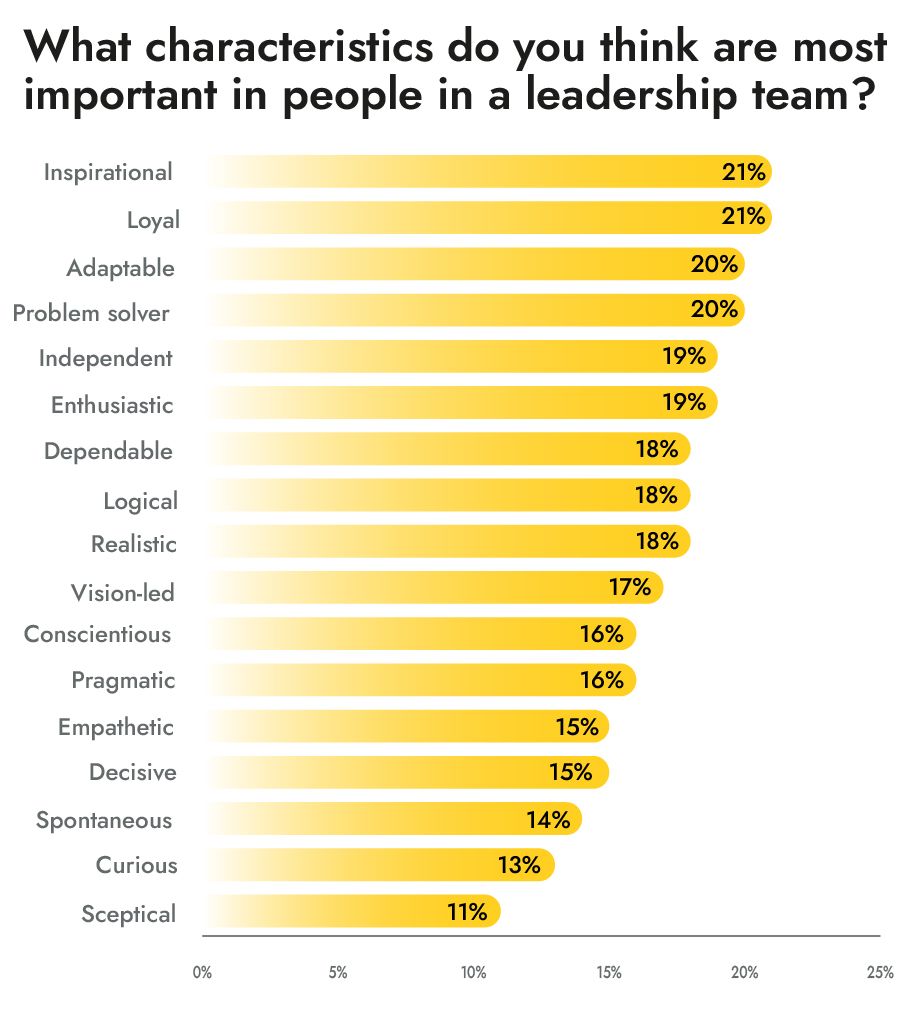
We can compare this with what CEOs said the most important traits were when talking about their own roles. The 2021 results highlighted that the top traits CEOs thought were necessary for business leaders were being realistic (25%), logical (24%) and loyal (19%).
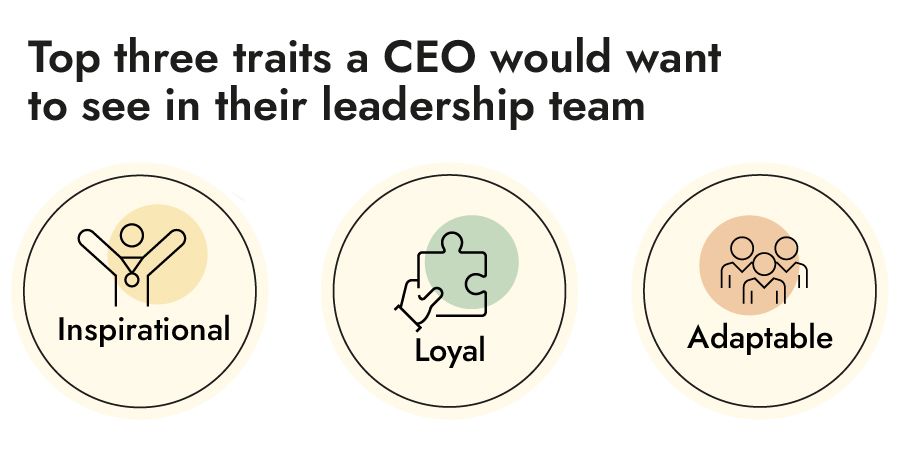

Lonely at the top
When it comes to advice about their businesses, while 40% of CEOs still look to their leadership team, the most popular source of advice was from their investors. At ECI, we frequently see that CEOs enjoy having this external sounding board, allowing them to test ideas with people they’re not directly responsible for. For similar reasons, a third of CEOs are likely to turn to a mentor.
This reliance on external, professional advice is particularly evident in the smallest businesses (10-49 employees) where 42% look for support from their investors, and a further 42% turn to their lawyers.
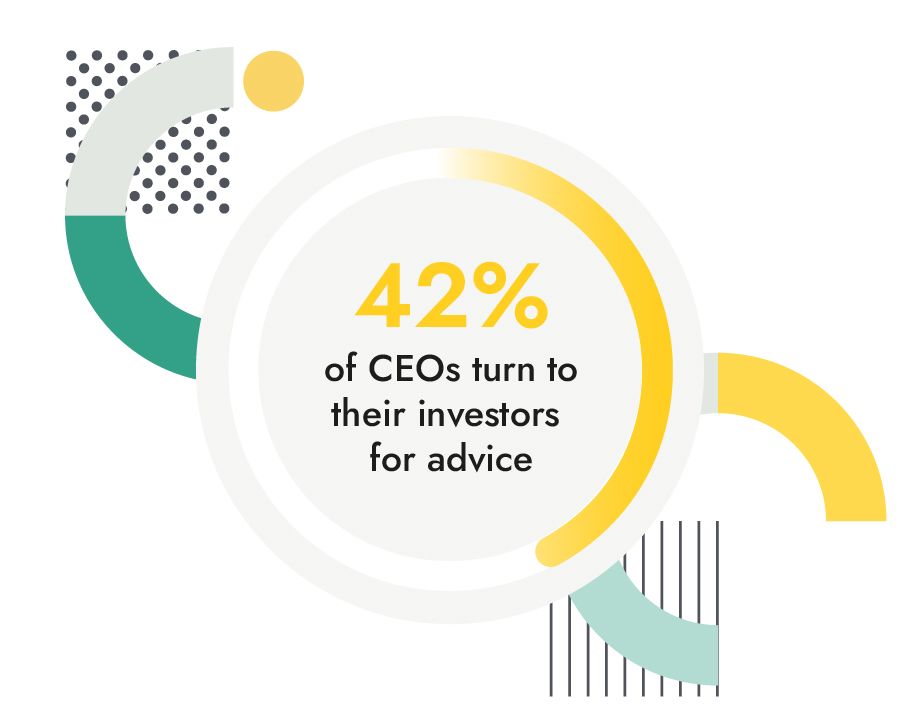
Lonely at the top
When it comes to advice about their businesses, while 40% of CEOs still look to their leadership team, the most popular source of advice was from their investors. At ECI, we frequently see that CEOs enjoy having this external sounding board, allowing them to test ideas with people they’re not directly responsible for. For similar reasons, a third of CEOs are likely to turn to a mentor.
This reliance on external, professional advice is particularly evident in the smallest businesses (10-49 employees) where 42% look for support from their investors, and a further 42% turn to their lawyers.
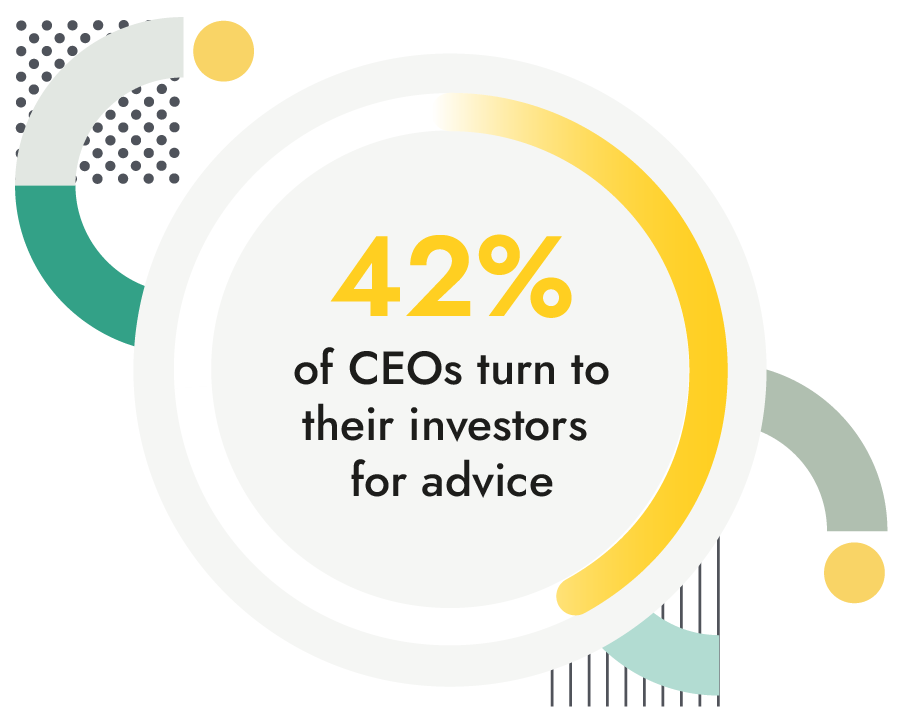

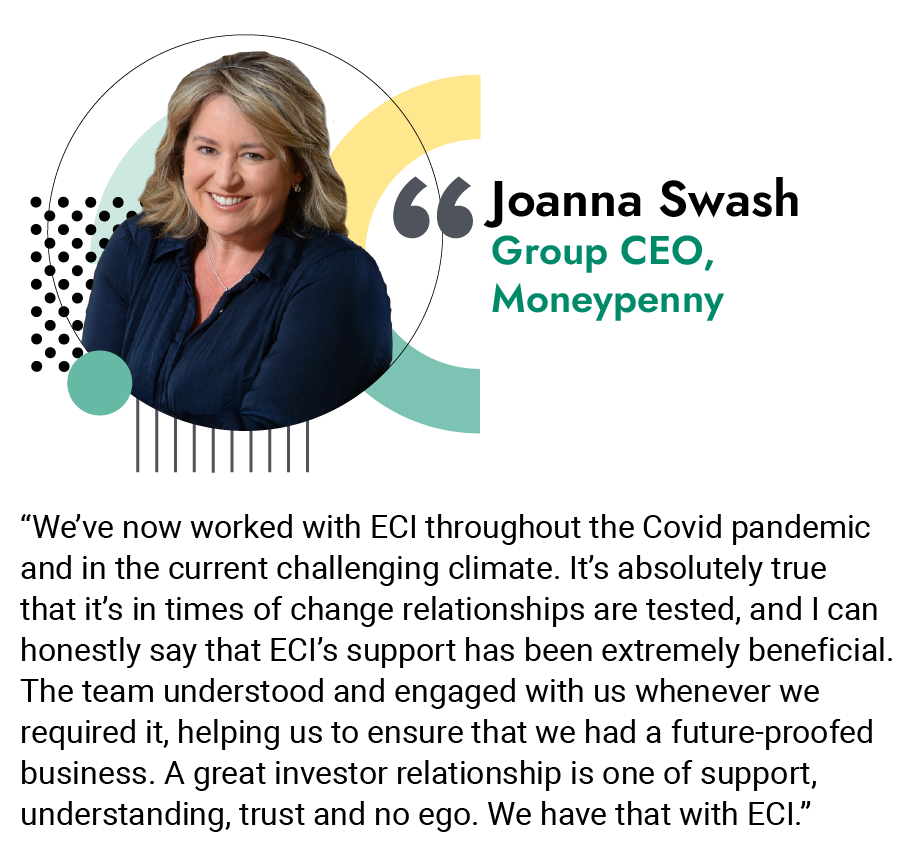
Social purpose rising
up the agenda
ESG may have once been seen as a tick box, but now its importance is absolutely ingrained in companies’ strategies, and rightly so. In fact, 74% of leaders put as much emphasis on ESG as they do on their company’s financial performance. This equal emphasis held true across all sectors and company sizes.
Today, more than half of leaders declare social purpose to be at the forefront of their overall business strategy, up from just under a third last year. Only 2% of leaders say social purpose doesn’t inform strategy at all, down from 15% last year.
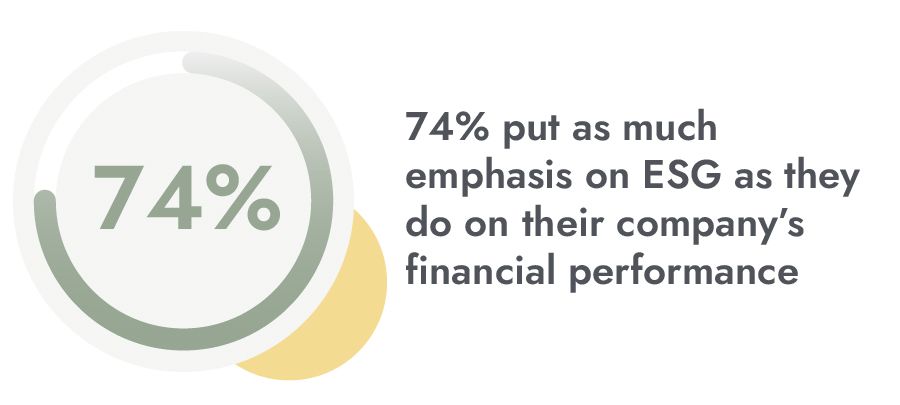
This is demonstrated by the fact that 28% of leaders want to hire a Chief Sustainability Officer within the next 12 months, a role that would have been very rare around the Board table until recently.


Social purpose rising
up the agenda
ESG may have once been seen as a tick box, but now its importance is absolutely ingrained in companies’ strategies, and rightly so. In fact, 74% of leaders put as much emphasis on ESG as they do on their company’s financial performance. This equal emphasis held true across all sectors and company sizes.

Today, more than half of leaders declare social purpose to be at the forefront of their overall business strategy, up from just under a third last year. Only 2% of leaders say social purpose doesn’t inform strategy at all, down from 15% last year.
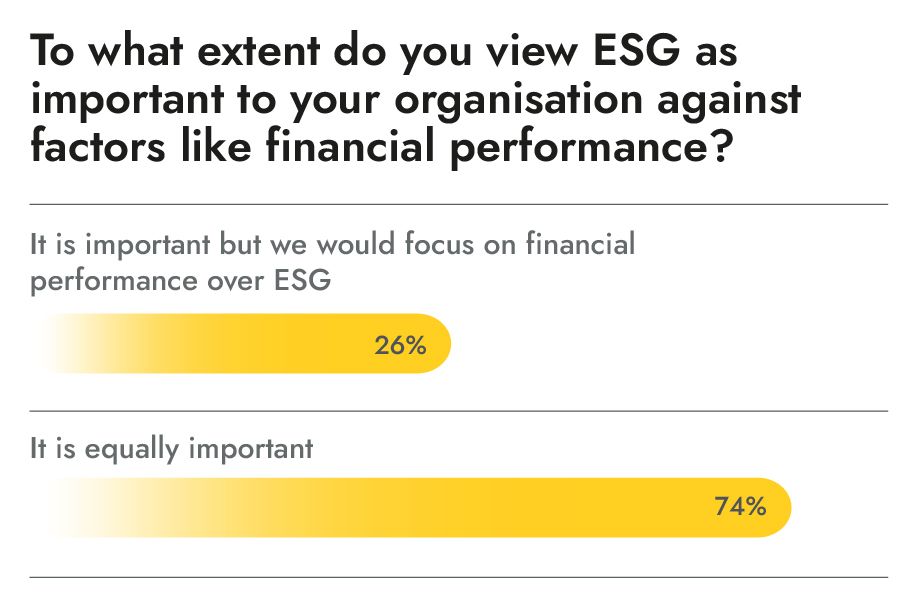
This is demonstrated by the fact that 28% of leaders want to hire a Chief Sustainability Officer within the next 12 months, a role that would have been very rare around the Board table until recently.


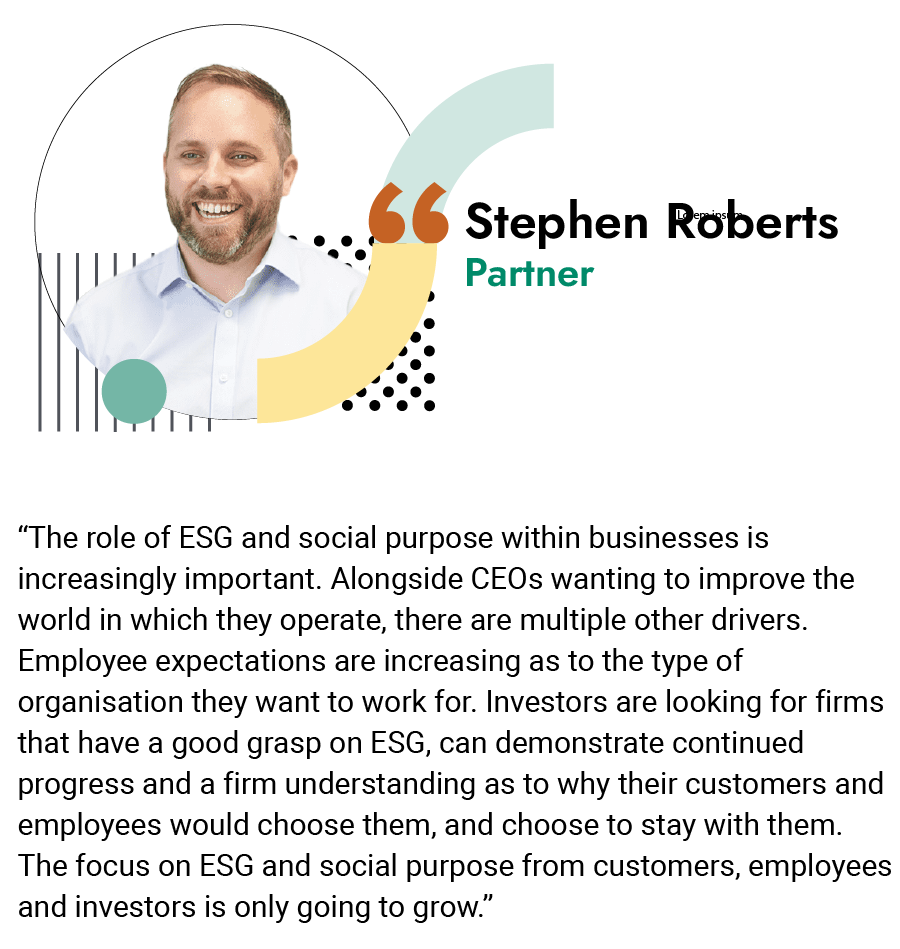
Inspiring your team
When we asked CEOs what drives engagement from their management team, we see a trend towards responsible leadership.
24% cited open and honest communication, and 24% stated that their leadership teams are motivated by a strong social purpose.

Effective feedback and development goals (23%) was the third most important factor for driving employee engagement, scoring higher than more traditional, tangible engagement drivers such as pay and benefits (20%) and work life balance (18%).


Inspiring your team
When we asked CEOs what drives engagement from their management team, we see a trend towards responsible leadership.
24% cited open and honest communication, and 24% stated that their leadership teams are motivated by a strong social purpose.

Effective feedback and development goals (23%) was the third most important factor for driving employee engagement, scoring higher than more traditional, tangible engagement drivers such as pay and benefits (20%) and work life balance (18%).
D&I in leadership teams
An important element of engagement is diversity and inclusion. Generally, we see that businesses are positive about the makeup of their leadership teams from a diversity perspective, with only 1 in 10 stating their Boards are not diverse.
The most popular strategies employed by those trying to improve the diversity of leadership teams were mentorship schemes and coaching (44%), changing recruitment processes (41%) and enhancing employee retention strategies (41%).
However, strategies vary by gender. Male CEOs are more likely to set targets and to change recruitment processes, while female CEOs are more likely to bring in external diverse hires, perhaps more focussed on ensuring immediate change in the team that surround them.


D&I in leadership teams
An important element of engagement is diversity and inclusion. Generally, we see that businesses are positive about the makeup of their leadership teams from a diversity perspective, with only 1 in 10 stating their Boards are not diverse.
The most popular strategies employed by those trying to improve the diversity of leadership teams were mentorship schemes and coaching (44%), changing recruitment processes (41%) and enhancing employee retention strategies (41%).
However, strategies vary by gender. Male CEOs are more likely to set targets and to change recruitment processes, while female CEOs are more likely to bring in external diverse hires, perhaps more focussed on ensuring immediate change in the team that surround them.

Aspirations and challenges ahead
Despite the uncertainty of the current climate almost all (99%) of business leaders say that they feel excited about the future of their business with nearly 6 in 10 (59%) saying they feel ‘completely excited’. That’s almost double the 30% in 2021 who said they felt ‘significantly more positive’ about their business than they did the previous year.
But that doesn’t mean the future is challenge free. 46% of leaders say their biggest challenge is related to people. This includes keeping employees happy and motivated (17%) to maintaining a high-performance culture (15%). More than double the percentage of CEOs saw these as the biggest challenge facing them compared to this time last year.

1 in 5 CEOs say digital transformation is their biggest challenge, with leaders hiring key tech and security roles to support this. The most in-demand hire in 2022 is a Chief Information Security Officer (37%), but Chief Financial Officers, Chief Technology Officers and Chief Data Officers are also in the top four roles that leaders are looking to hire over the next 12 months.
In smaller businesses, however, the focus is more likely to be on finance-focused senior roles, with 43% looking for a CFO and 39% a Chief Revenue Officer to support growth strategies.


Aspirations and challenges ahead
Despite the uncertainty of the current climate almost all (99%) of business leaders say that they feel excited about the future of their business with nearly 6 in 10 (59%) saying they feel ‘completely excited’. That’s almost double the 30% in 2021 who said they felt ‘significantly more positive’ about their business than they did the previous year.
But that doesn’t mean the future is challenge free. 46% of leaders say their biggest challenge is related to people. This includes keeping employees happy and motivated (17%) to maintaining a high-performance culture (15%). More than double the percentage of CEOs saw these as the biggest challenge facing them compared to this time last year.

1 in 5 CEOs say digital transformation is their biggest challenge, with leaders hiring key tech and security roles to support this. The most in-demand hire in 2022 is a Chief Information Security Officer (37%), but Chief Financial Officers, Chief Technology Officers and Chief Data Officers are also in the top four roles that leaders are looking to hire over the next 12 months.
In smaller businesses, however, the focus is more likely to be on finance-focused senior roles, with 43% looking for a CFO and 39% a Chief Revenue Officer to support growth strategies.


Succession planning
Despite leaders being broadly excited about the future of their business, since last year there has been a 25% increase in the proportion of CEOs looking to leave their business within the next 12 months.
Although 20% of leaders want to run their businesses indefinitely, 20% want to sell it to their leadership teams, double those who sought to do so this time last year. And 15% want to pass it onto their family, three times as many as those who looked to do so in 2021.
Growth rate has a direct correlation for planned tenure. Those leaders in businesses with a 10-19% growth rate plan to stay for an average of 5 years compared to nearly 10 years for those with a 50%+ growth rate.


Succession planning
Despite leaders being broadly excited about the future of their business, since last year there has been a 25% increase in the proportion of CEOs looking to leave their business within the next 12 months.
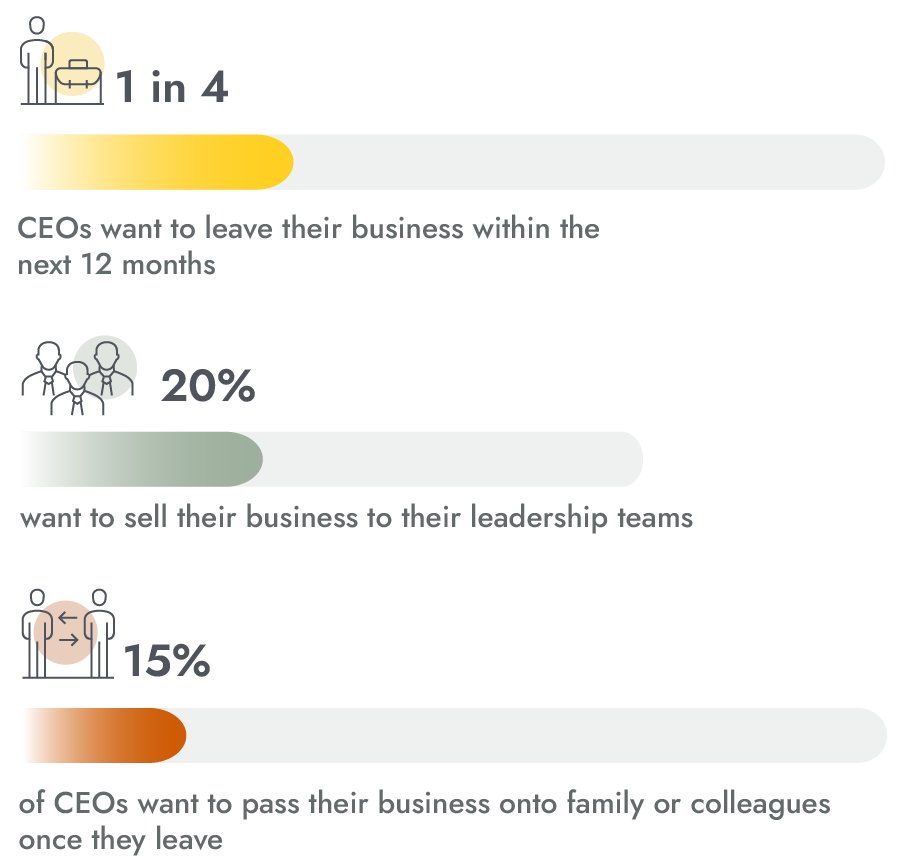
Although 20% of leaders want to run their businesses indefinitely, 20% want to sell it to their leadership teams, double those who sought to do so this time last year. And 15% want to pass it onto their family, three times as many as those who looked to do so in 2021.
Growth rate has a direct correlation for planned tenure. Those leaders in businesses with a 10-19% growth rate plan to stay for an average of 5 years compared to nearly 10 years for those with a 50%+ growth rate.
“We know just how fundamental effective leaders are to the success of a business, but this report evidences that leaders clearly aren’t working in isolation. They are looking for inspiration, support and diversity of thought from the teams around them. It is encouraging to see how many leaders are focused on expanding their leadership teams and motivating them through a common social purpose. They also value the support of external parties such as investors and mentors, who can provide a sounding board through the ups and downs. We at ECI believe that if you have the right team and partners in place there are opportunities in any market environment, and it is pleasing to see that business leaders share that belief.”

“We know just how fundamental effective leaders are to the success of a business, but this report evidences that leaders clearly aren’t working in isolation. They are looking for inspiration, support and diversity of thought from the teams around them. It is encouraging to see how many leaders are focused on expanding their leadership teams and motivating them through a common social purpose. They also value the support of external parties such as investors and mentors, who can provide a sounding board through the ups and downs. We at ECI believe that if you have the right team and partners in place there are opportunities in any market environment, and it is pleasing to see that business leaders share that belief.”

ECI surveyed 513 UK CEOs, Founders and Managing Directors of fast growing SME businesses across multiple subsectors including, education, financial services, healthcare/pharmaceuticals, HR, training and recruitment, law and legal services, professional services, retail and consumer goods, technology and travel sectors. Respondents were surveyed in Autumn 2022 regarding their views on the skills and traits needed in a leadership team, the important of social purpose, ESG and D&I, the challenges facing them today and their future plans for their business.


